Taste a true winter in Seoul and Gangwon-do
The flavors of snowy coldness and the fireplace warmth will delight you
For more than 500 years, the wealthy and powerful aristocrats in Seoul enjoyed rare and expensive ingredients like beef establishing quite a beef culture. You may find dishes in Seoul to be more sophisticated and elegant, while those in Gangwon-do are more rustic.
Seoul
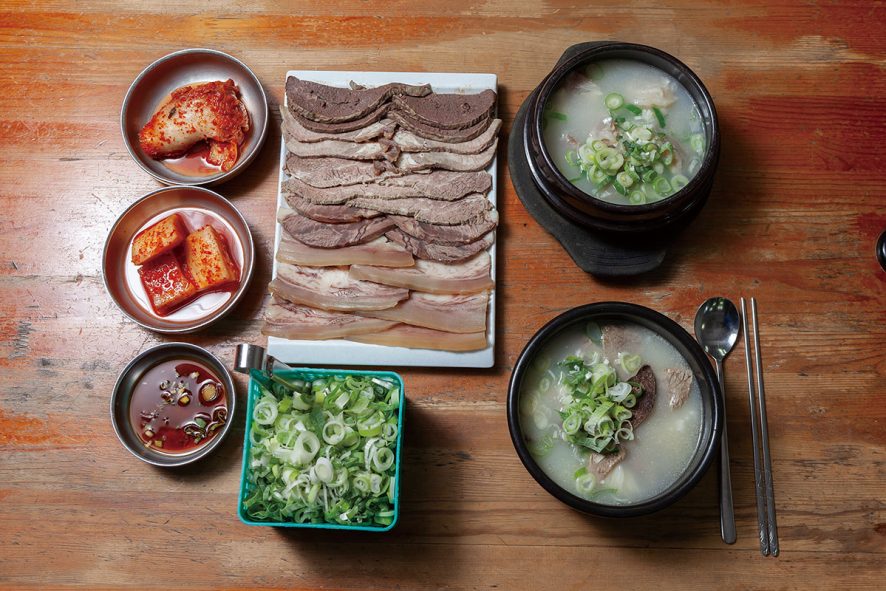
Seolleongtang, Dogani tang
When feeling sluggish in winter, try the beef and rice soup, and soon you’ll regain strength and energy
Seolleongtang originates from the altar foods of Seonnongdan where Joseon kings prayed to ancestors for prosperity. The soup contains different ox parts and is simmered for hours. When the soup is brought to your table, mix in the steamed rice. The rich flavor of the soup really goes well with kimchi. Dogani tang is a soup made with knuckle bones boiled for many hours with great care. Like seolleongtang, mix the rice with it before eating. The chewy and umami rich Dogani is a precious part of beef as only 1kg of dogani is collected from an ox. When served with boiled beef slices, it tastes better. Add some chopped green onions or kkakdugi (diced radish kimchi) juice. It seems like a weird combination, but you will soon realize the taste is superb.
“Add some green onions to the soup to make it taste even better.”
Recommended Restaurants
![[크기변환]서울_이문설농탕 [크기변환]서울_이문설농탕](https://m.dgram.co.kr/wp-content/uploads/2020/03/크기변환서울_이문설농탕-1-395x263.jpg)
IMUN SEOLNONGTANG
- Address:
- 38-13 Ujeongguk-ro, Jongno-gu, Seoul
- Tel:
- 02-733-6526
- Business Hour:
- 08:00 ~ 21:00
- Closed during Korean traditional public holidays
![[크기변환]서울_마포양지설렁탕 [크기변환]서울_마포양지설렁탕](https://m.dgram.co.kr/wp-content/uploads/2020/03/크기변환서울_마포양지설렁탕-1-395x263.jpg)
Mapo Yangji Seolleongtang
- Address:
- 6 Saechang-ro, Mapo-gu, Seoul
- Tel:
- 02-716-8616
- Business Hour:
- 07:00~22:00
- Closed during Korean traditional public holidays
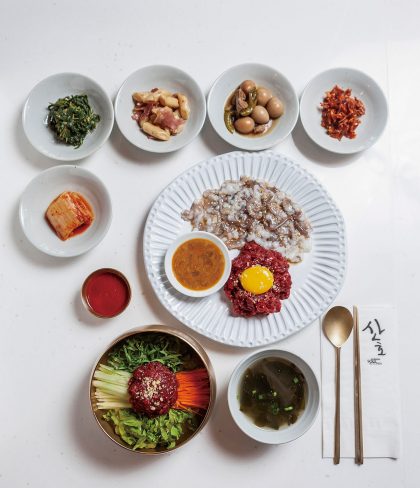
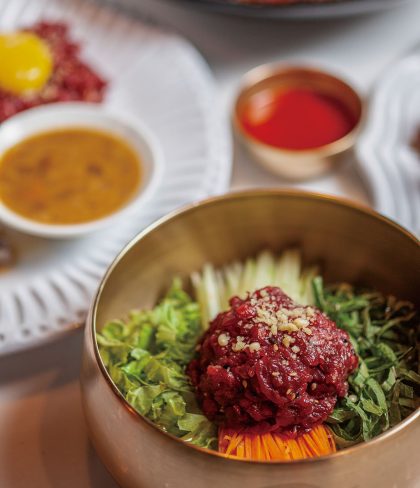
Yukhoe bibimbap, Yukhoe nakji tangtangi
The light, savory flavor of fresh yukhoe is great on its own, but is also fantastic with nakji
Yukhoe is fresh beef tartare where lean beef parts like rump rounds, topsides and inside rounds are used. Unlike Jeolla-do style yukhoe, which is tossed with a chili paste marinade; Seoul style yukhoe uses sesame oil and pear to create a clean flavor. The tartare can be enjoyed alone, Another delicacy is yukhoe nakji tangtangi(yukhoe with pygmy octopus), when an egg yolk is added, the flavor becomes softer and more savory.
“Try mixing yukhoe with the yellow egg yolk, which doubles the savory flavor of the meat.”
Recommended Restaurants
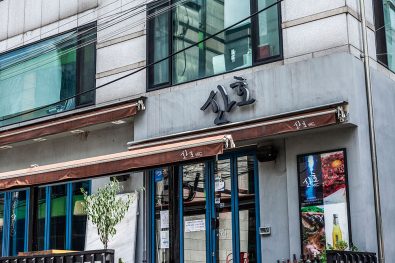
Sanho
- Address:
- 111 Nonhyeon-ro 175-gil, Gangnam-gu, Seoul
- Tel:
- 02-517-0035
- Business Hour:
- 11:30~23:50
- Break Time:
- 15:00~17:30
- Closed Sundays
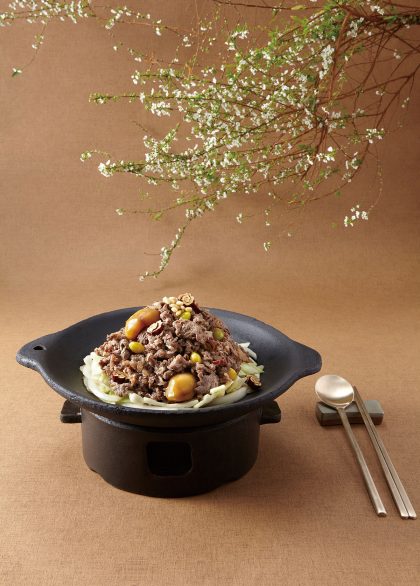
Bulgogi , eoriguljeot
Bulgogi itself is tasty enough, but rice mixed with the sauce tastes better
Bulgogi is thinly sliced beef marinated in soy sauce, then grilled. Each region has its own way of cooking bulgogi. Locals in Seoul place the beef on a tabletop griddle and pour on the marinade. The griddle has a hole that keeps the meat moist and also gives the beef a light smoky flavor. When eating the rice, add some sauce from the grill and it will taste much better. Bulgogi is often served with eoriguljeot (seasonal specialty of marinated and fermented oysters), a delicious side dish that aids indigestion.
Recommended Restaurants

Hanilkwan – Apgujeong Branch
- Address:
- 14 Apgujeong-ro 38-gil, Gangnam-gu, Seoul
- Tel:
- 02-732-3735
- Business Hour:
- 11:30~21:30
- Closed during Korean traditional public holidays
![[크기변환]서울_지니선복죽-1604 [크기변환]서울_지니선복죽-1604](https://m.dgram.co.kr/wp-content/uploads/2020/03/크기변환서울_지니선복죽-1604-420x553.png)
Jeonbok juk, Jeonbok heungmi juk, Jeonbok maesaengi juk
Comfort food that heals and warms both body and soul
Considered a healing food by Koreans, juk is rice simmered slowly to make a white porridge to which a variety of ingredients can be added. Chewy abalone and savory viscera are added to make the nutritious jeonbok juk. In the past, abalone was a precious specialty offered to kings as a gift, now it is easily available. Jeonbok heungmi juk is an abalone porridge with black rice, which has a fuller flavor. To make jeonbok maesaengi juk, seaweed is added. Abalone porridge is most delicious in winter as abalone is best during the cold months; and the porridge will reboost your energy during the cold winter.
“Savory abalone porridge warms your body and soul in the winter.”
Recommended Restaurants
![[크기변환]서울_지니선복죽 [크기변환]서울_지니선복죽](https://m.dgram.co.kr/wp-content/uploads/2020/03/크기변환서울_지니선복죽--395x263.jpg)
Jini Jeonbok Juk
- Address:
- 6 Nonhyeon-ro 106-gil, Gangnam-gu, Seoul
- Tel:
- 02-522-1052
- Business Hour:
- 10:00~20:30
- Closed during Korean traditional public holidays
Pyeongchang, Gangwon-do
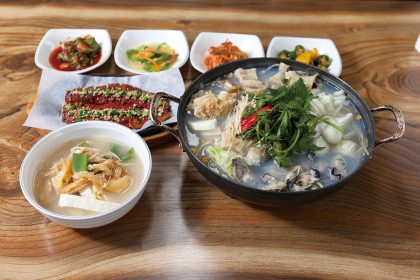
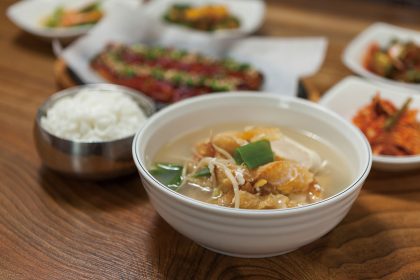
Hwangtae guk, Hwangtae gui
Enjoy the umami dried pollack in unconventional ways. How about pollack soup or grilled pollack?
Hwangtae is pollack that is dried in the winter wind, making it flavorful and chewy. This Pyeongchang specialty can be cooked in various ways. The most representative dishes are hwangtae soup and grilled hwangtae. The milky white soup is made with hwangtae, soybean sprouts, tofu, mushroom, and vegetables. The sweet and spicy grilled hwangtae is dried pollack coated with chili paste then grilled. To boost umami, oysters are often added to hwangtae dishes such as the dried pollack & oyster hot pot,and the spicy stewed dried pollack & oysters.
“Dried pollack can be enjoyed grilled and spicy; or with oysters in a hot pot or stew to boost its umami flavor.”
Recommended Restaurants
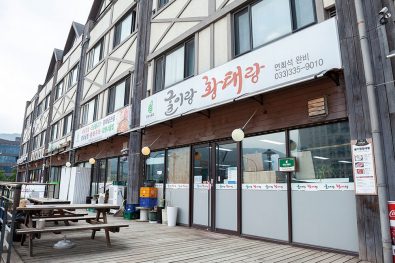
Gulirang Hwangtaerang
- Address:
- 39 Nunmaeul-gil, Daegwallyeong -myeon, Pyeongchang-gun, Gangwon-do
- Tel:
- 033-335-9010
- Business Hour:
- 07:00~22:00
- Open year-round
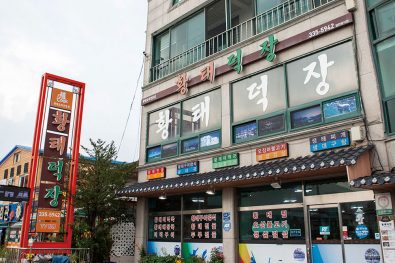
Hwangtae Deokjang
- Address:
- 21 Nunmaeul-gil, Daegwallyeong -myeon, Pyeongchang-gun, Gangwon-do
- Tel:
- 033-335-5942
- Business Hour:
- 07:00~23:00
- Open year-round
Sokcho, Gangwon-do
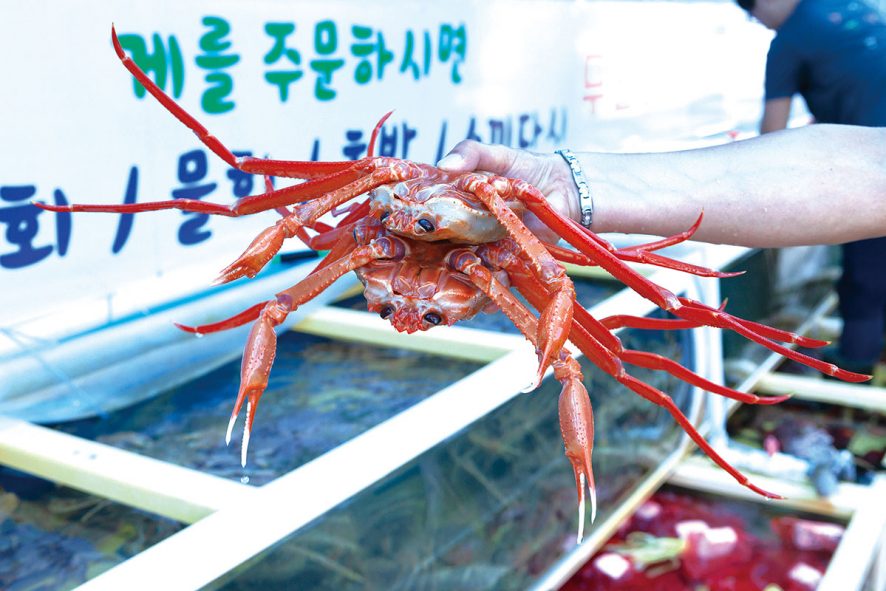
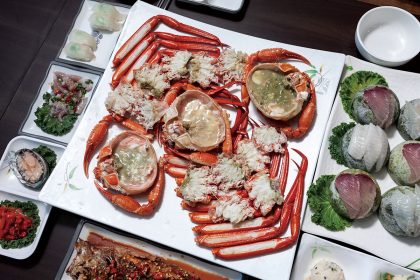
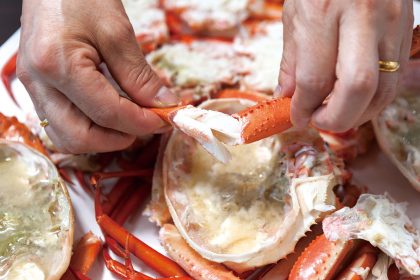
Bulgeun daege
Snow crab is soft, salty and sweet reflecting the aroma of Donghae (the east sea of Korea)
Red snow crab, a specialty of Sokcho, is caught only in the East Sea. The legs resemble bamboo (dae in Korean), hence the name red daege. The crab is steamed whole with no condiments added. The snowy white flesh is delicious on its own. You could eat it with the natural juice found inside the shell, or you could dip it in soy sauce or vinegar infused chili paste. When you order the steamed red snow crab at seafood restaurants, side dishes like raw fish, raw fish in cold broth or salad are served. Be sure to try the bibimbap with snow crab shells, a delicious mixture of rice, crab viscera, sesame oil and laver crumbs served in the shell.
“Toss together the crab viscera with rice, laver crumbs and sesame oil. You will not be able to stop eating it.”
Recommended Restaurants
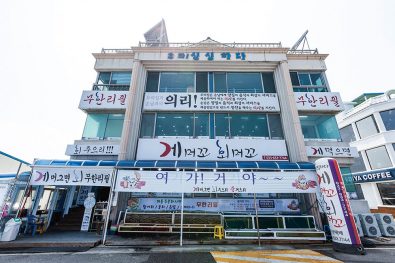
Ge Meokko Hoe Meokko
- Address:
- 49 Jangsahanghaean-gil, Sokcho-si, Gangwon-do
- Tel:
- 033-633-7744
- Business Hour:
- 10:00~22:00
- Closed during Korean traditional public holidays
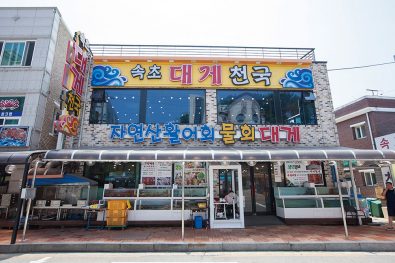
Sokcho Daege Cheonguk
- Address:
- 24 Yeonggeumjeong-ro, Sokcho-si, Gangwon-do
- Tel:
- 033-637-6999
- Business Hour:
- 10:00~23:00
- Open year-round
Goseong, Gangwon-do
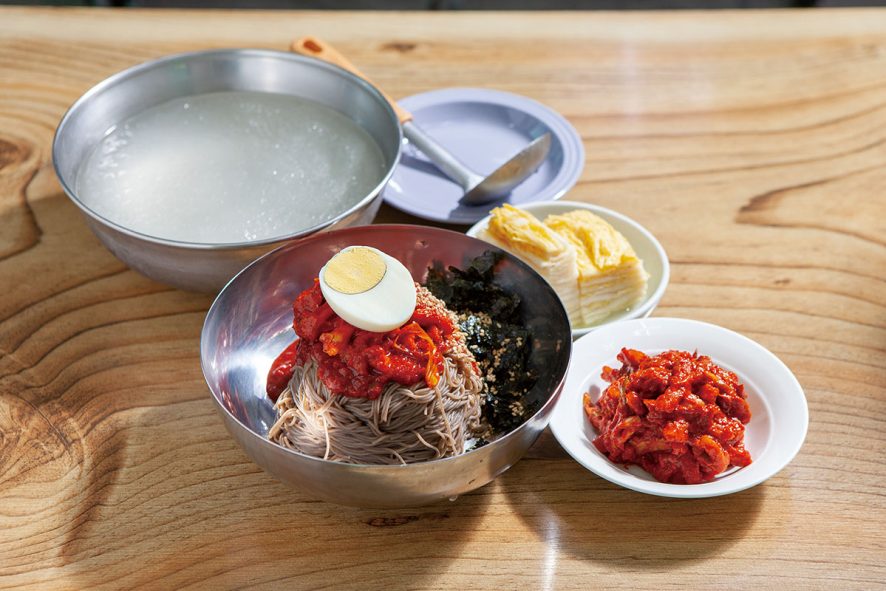
Dongchimi makguksu
special treat – icy buckwheat noodles served with ice cubes on a cold winter night
Noodles made of buckwheat powder are called makguksu. In Goseong, the locals enjoy icy cold buckwheat noodles with radish kimchi broth during the winter. Not only do the ingredients go well together, but the light radish kimchi juice also helps the digestion of buckwheat. Another seasonal specialty is the spicy buckwheat noodles with spicy fermented pollack, which is made with pollack, radish, millet and chili pepper powder. Try the noodles with rice wine and boiled meat slices.
“Makguksu has buckwheat’s distinctive savory aroma. The buckwheat noodles come with a glass of warm myeonsu (water from the boiled noodles).”
Recommended Restaurants
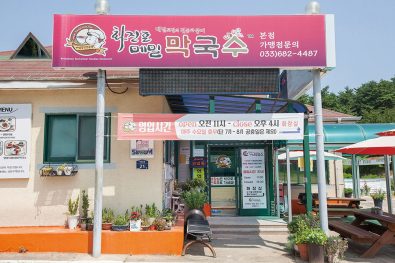
Hwajinpo Makguksu
- Address:
- 21 Hwajinpo-gil, Geojin-eup, Goseong-gun, Gangwon-do
- Tel:
- 033-682-4487
- Business Hour:
- 11:00~18:30
- Closed Wednesdays
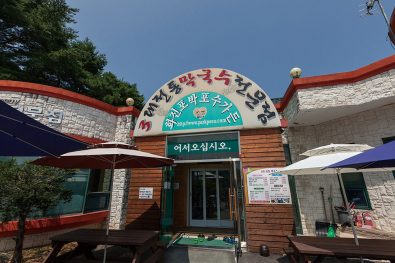
Hwajinpo Parkposu Garden
- Address:
- 76 Hwajinposeo-gil, Hyeonnae-myeon, Goseong-gun, Gangwon-do
- Tel:
- 033-682-4856
- Business Hour:
- 10:30~19:00
- Closed during Korean traditional public holidays


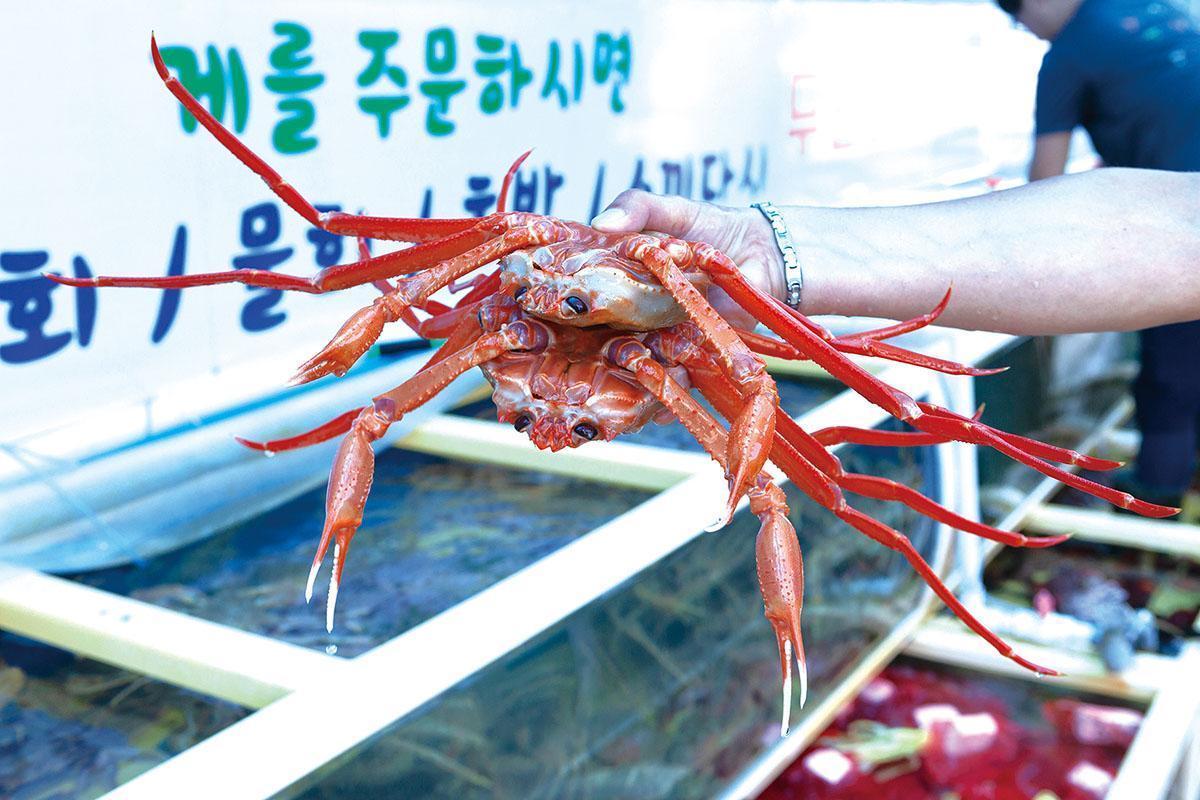










![[A ZONE] Gangnam Food Spot](https://m.dgram.co.kr/wp-content/uploads/2020/09/A존-알래스카3-특성이미지_S-324x160.jpg)
![[A ZONE] Gangnam Life Style](https://m.dgram.co.kr/wp-content/uploads/2020/09/로우클래식1-특성이미지_S-324x160.jpg)





Hello, what a good information in your blog listed here The public is the solid foundation for charity Regards, Verna Vukich
We meet many people everyday in our life. We all struggle everyday try to be someone that good to other people life too. We need to appreciate all the people that we met everyday in our life.